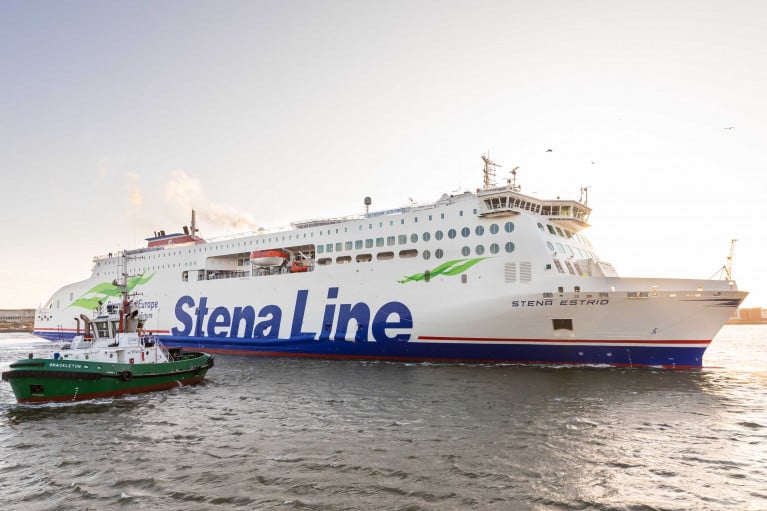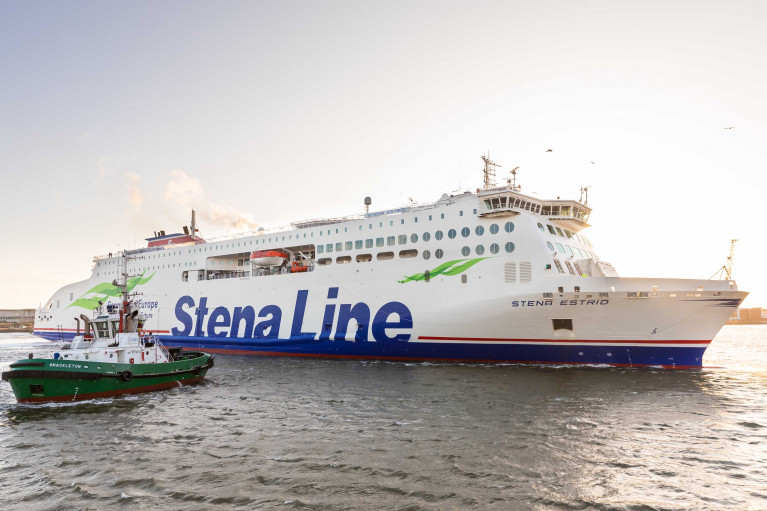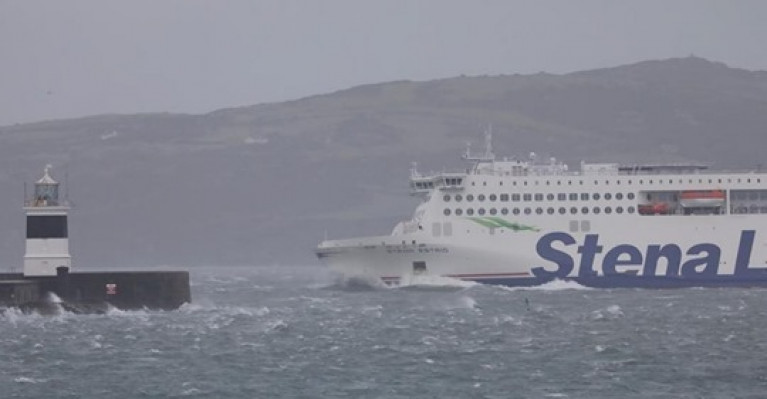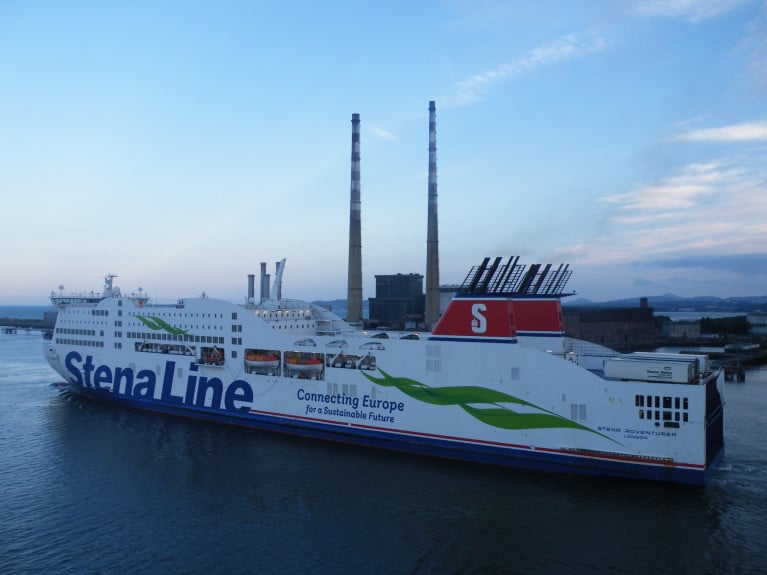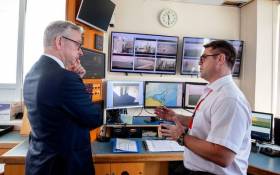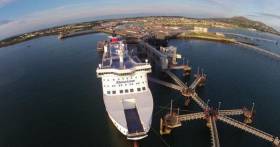Displaying items by tag: Stena Line
Ferry firm Stena Line, based in Sweden, will furlough 600 employees and make 150 redundant across the UK and Ireland, it said (yesterday), as a result of the impact of the new coronavirus on the volume of traffic on its routes.
"This urgent measure is an unavoidable response to the on-going global COVID-19 crisis, that has had a hugely damaging effect on travel and transport across Europe," the privately held company said in a statement.
The company said it was experiencing a huge decline in travel bookings and freight volumes and that passenger figures were not expected recover until well into 2021.
"As a result of the significant reduction in revenue, the firm is forced to take tough decisions in order to cut costs and ensure that their vital supply lines of essential goods to the UK and Ireland are protected," it said.
Those who have been furloughed will keep 80% of their salaries, with the company making up the difference in circumstances where the Irish and UK Government schemes don't cover the full amount.
Both shore-based and sea-based employees will be impacted by the furlough decision and redundancies and consultation with unions has begun. The company has already laid off 950 staff in Scandinavia.
For more RTE News reports here.
Ferry operator Stena Line in response to the impact of the Coronavirus as it tightens its grip on everyday life across Europe, has moved to reassure freight and travel customers.
The operator is taking every precaution possible to help ensure the safety of customers and employees, whilst maintaining the supply lines for vital medical goods and food supplies.
In the last few weeks Stena Line’s European business has been impacted significantly by COVID-19, but despite crippling trading circumstances, the biggest ferry company in Europe remains resolute in its determination to keep services going in strict adherence to Government guidelines on travel, as well as the very latest medical advice on helping to reduce the risk of spreading COVID-19.
Stena Line is asking customers to adhere to Government travel guidelines and the firm has put a host of measures in place to keep its customers and employees safe when travelling on its vessels. To assist passengers who need to reschedule their trips, Stena Line has also committed to waiving amendment fees for all travel bookings, until 30th April 2020.
All of Stena Line’s ferries are continuing to run on schedule, however, some services have restricted passenger numbers in order ensure strict social distancing guidelines are adhered to.
Stephen Bryden, Group Head of Onboard Sales & Services said: “We really are in uncharted waters right now so we are having to dig deep and use all of our experience and take the advice of the Governments where we operate, and their medical experts, to help us navigate our way through this crisis to. Keeping our customers and colleagues safe while keeping our important services operational is our main priority at the moment.”
“We are acutely aware of the responsibility we have to help maintain vital supply lines between the UK and Ireland, as well as Continental Europe. Our services and work colleagues will be put under immense strain in the weeks and months ahead. We appreciate people will still need to travel for essential reasons and we will be there to support them.”
“Now, more than ever, Freight supply lines are vital to help keep the supermarkets stocked and ensure critical medicines and medical equipment are delivered. We will do everything within our means to keep these important logistics routes open and functioning.”
Recently Stena Line has introduced a large number of additional measures on top of its existing high health and safety standards in a bid to help safeguard its passengers and crew during the COVID-19 crisis including the following:
· Staged embarkation and disembarkation, with all arriving passengers asked to clean hands
· Hand sanitisers available for customers and staff use throughout
· ‘High contact’ surfaces sanitised on a regular basis
· Freight drivers have their own cabin
· Social and Counter Distancing measures in line with governmental recommendations
· Electrostatic Fog Machine for deep cleaning of specific areas (Irish Sea routes)
· Cashless payments are requested in all payment points
· Personal Protective Equipment (PPE) kits for and staff
· Use of contactless thermometers to help should someone show any symptoms
· All newspapers & magazines removed to reduce the risk of cross contamination
· Isolation cabins have been allocated and set aside should they be needed
· Daily staff briefings for crew and strict guidelines to adhere to
· Detailed Evacuation Plan (ship and shore) for affected customers/crew
Stena Line will continue to operate its Ireland and UK sailing schedules as normal, however, given the now daily changes in prevailing circumstances and Government advice, sailing schedules are naturally under constant review.
For the very latest information, Stena Line customers are advised to contact: 01 907 5555 (Ireland) and 03447 707 070 (UK)
For information on the Coronavirus click HERE.
On the Irish Sea ferry company Stena Line has told staff they won't be paid their normal sick pay during the Covid-19 pandemic, a union has said.
The Rail and Maritime Transport Union (RMT) said the ferry giant has removed its normal sick pay rules - which entitles workers to full pay when they are off - leaving them only entitled to the statutory minimum of £94.25 per week.
The RMT attacked the move and one worker said it risked staff going to work even if they are feeling ill - potentially increasing the risk of spreading the coronavirus.
The move impacts staff at ports like Holyhead and Liverpool in the UK, Dublin in Ireland and crew on vessels.
North Wales Live reported that a source close to the company said the move was needed to protect the firm's future during the coronavirus crisis.
For more on this ferry development from WalesOnLine click here
Ferries Old & New Swap Stena Sailing Rosters for Annual Dry-Docking
The longest serving Dublin-Holyhead ferry operated by Stena Line departed the Irish capital this morning bound for Falmouth in the UK to undergo annual dry-docking, writes Jehan Ashmore.
Stena Adventurer built in South Korea was launched onto the Irish Sea central corridor route in 2003, is to dry-dock at A&P Falmouth, Cornwall and where a refit of some passenger facilities is also to take place. This is to update passenger facilities among them a 'Hygge' Lounge, a feature on board the new Stena Estrid, the operator's first E-Flexer ropax class built in China which last month entered service.
Taking over the sailing roster of Stena Adventurer is the Stena Estrid. As for newbuild's own roster this in turn is to be covered by Stena Superfast X, which transpires has made a return to its former Irish Sea route to maintain a two-ship service. This follows a stint on the Rosslare-Cherbourg route as Afloat previously reported.
Prior to the Superfast X return to the Ireland-Wales route, a repositioning passage saw the German built ferry depart the Wexford port and arrive at Anglesey yesterday. On Monday, the Ireland-France route's routine ropax ferry Stena Horizon returned from A&P Falmouth having completed a planned dry-docking.
Afloat yesterday evening tracked Stena Adventurer enter Dublin Port following a non commercial sailing from Holyhead, as the ferry did not berth at the ferryport Terminal 2 but instead headed upriver to Ocean Pier, Alexandra Basin East.
According to an Afloat source, Stena Adventurer berthed in the Basin for a Marine Survey Office (MSO) audit. At the same time this allowed relief ferry Stena Superfast X to berth at the nearby ferryport's No. 51 berth, before the 'Adventurer' departed for dry-docking.
The Stena Adventurer remained in Alexandra Basin overnight before departing this morning. The 210m long ferry is expected to arrive at Falmouth tomorrow morning and enter A&P Falmouth's Dry-Dock No.2.
Stena Says No-Deal 'Worst Possible Scenario' Day After Gove Predicted 'No Significant Delays'
The ferry giant Stena Line says a no-deal Brexit remains the "worst possible scenario" and a lack of clarity has made it "almost impossible" to plan for.
The company writes NorthWalesLive, warned no-deal brought the "high potential for significant delays and congestions" at Holyhead - the UK's second busiest passenger port.
This comes a day after Michael Gove (visited Holyhead), the minister in charge of Government preparation for no-deal, said ports are "geared up" for Brexit and should avoid any significant delays and congestion.
The UK is currently on course to leave without a deal on October 31 unless a compromise deal can be reached or Parliament intervenes to prevent no-deal.
Within the last fortnight Afloat adds the UK Chancellor also paid a visit to the Port of Dover in addition to Warrenpoint Harbour in Co. Down.
More on the story can be read here
Ferry Operator Gives Holyhead Free Port Verdict But Has This Message for UK Government
The port authority in Holyhead, Stena Line says free port status for the town could bring "immediate opportunities" but also had a message for UK Government.
The ferry giant according to NorthWalesLive, was commenting after Boris Johnson's Government unveiled plans for 10 free ports across the UK after Brexit.
They allow firms to import goods and then re-export them outside of normal tax and customs rules.
While Stena said free port status could bring benefits, their message to the UK Government was that reaching a deal with the EU remains the "best possible solution".
Ian Hampton, Stena Line Brexit spokesperson, said: "Holyhead is the second largest roro port in the UK and the largest port facility owned by the Stena Line Group, so naturally the Company is currently seeking further clarification from the UK Government on all the proposals that are being issued to help ensure the prosperity of the UK in a post-Brexit era.
For further reading on this development click here.
Crew Members from Stena Volunteer for Mercy Ships
Following another successful volunteer program in 2018, two more employees from a ferry company are preparing for a three-month adventure, joining the Mercy Ships hospital ship ‘Africa Mercy’.
In addition to fundraising and raising awareness for the humanitarian NGO, Stena Line also aims to contribute the unique technical and naval competence held by its employees to the work of Mercy Ships.
In the next few days two Stena Line Able Seamen, Martina Thowsen and Alexander Gustafsson, will commence their journey in the Las Palmas ship yard where the hospital ship Africa Mercy is scheduled for maintenance before continuing the journey down to the coast of Senegal. Exactly what their specific tasks will be depends on the ship’s needs at the time, but they both up for the challenge.
“I feel very prepared for what is yet to come and want to thank my colleagues at Stena Line who have shared with me their very valuable experience and knowledge”, says Alexander Gustafsson, Able Seaman at Stena Nautica, operating on the Varberg - Grenaa route.
There are more than 200 different roles required to run the Africa Mercy ship and even though medical care is the substantive part of the operation, other professions are much needed including carpenters, mechanics, security officers and chefs to mention just a few. Onboard there will be around 50 different nationalities sharing their knowledge and onboard experiences as part of the team.
“I am looking forward to meeting people from other cultures and countries, but most of all I am looking forward to contributing to this great cause. Even though I’m not working with the medical care team, on Africa Mercy I will still be helping to improve people’s lives”, says Martina Thowsen, Able Seaman on Stena Scandinavica, which operates the Gothenburg - Kiel route.
The volunteer program is part of Stena Line’s sustainability strategy, which combines three dimensions of sustainability; economic, ecological and social. The program was launched in 2017 and employees from all eight of the shipping company’s regions are encouraged to apply. In accordance with Mercy Ship´s values, all volunteers work for free. Stena Line guarantees leave of absence and provides overhead expenses and all necessary vaccinations.
Irish Media Vote Stena Line Best Ferry Company
At the 2019 Travel Media Awards, travel writers, bloggers and influencers from all over Ireland have voted Stena Line Best Ferry Company for the seventh year in succession.
More than 200 guests gathered at the Travel Media Awards event which was held in the Shelbourne Hotel, Dublin. They are the only awards that call on members of the media to vote for their favourite travel companies.
Now in their ninth year, the awards comprise of 26 categories which are voted for by a wide cross section of media in Ireland, independently audited and managed by Technological University Dublin (TUD).
Diane Poole OBE, Stena Line’s Travel Commercial Manager, Irish Sea South, was thrilled to pick up the award on behalf of Ireland’s market leading ferry company.
“This award is very special to us as it is voted for by travel media across Ireland, who play such an important role in communicating what the travel industry has to offer Irish holidaymakers,” said Diane.
“To know that media have travelled with us, sampled our service and hold us in such high regard is very pleasing and this award is a fantastic independent endorsement of the Stena Line product, the quality of our service and our facilities on-board.
“I’d like to take this opportunity to thank all of the journalists, bloggers and influencers who voted for us – and also pay tribute to our amazing employees who go the extra mile every day to make sure that our customers have the best possible travel experience.
“At Stena Line, we never stand still and are always looking at ways to improve our service for travel and freight customers – which is reflected by continued investment in our routes and fleet. In this respect, we’re all looking forward to welcoming three new E-Flexer ships on our Irish Sea routes over the next couple of years, starting with the Stena Estrid which is on schedule to enter service on our Dublin to Holyhead route in early 2020,” concluded Diane.
The three new E-Flexer vessels, currently under construction in China, represent a significant multi-million pound investment by Stena Line in the Irish Sea region.
The Stena Estrid will be first to arrive on the Dublin to Holyhead route early next year, followed by the Stena Edda on the Belfast to Liverpool route in spring 2020. The third ship will also be introduced on the Belfast to Liverpool route in 2021.
All three vessels will be larger than today’s standard RoPax vessels at 215 meters long with a freight capacity of 3,100 lane meters and the space to carry 120 cars and 1,000 passengers.
The company is the largest ferry operator on the Irish Sea, with routes as mentioned above between Ireland and Britain and also Belfast to Heysham, Belfast to Cairnryan and Rosslare to Fishguard.
In addition they are the only operator to offer a direct service from Rosslare to Cherbourg with three return crossings a week on the Ireland-France route.
New Freight Record Set By Stena Line on Its Dublin-Holyhead Service
#DublinPort - A major operator in Dublin Port, Stena Line has set a new company record for freight on its service to Holyhead, carrying a total of over 250,000 units in 2018.
The milestone was achieved today, when Patrick van der Vijver from Hannon Transport completed the 08.10 hrs crossing from Dublin to Holyhead.
Patrick had the honour of transporting the freight unit on the Stena Adventurer. To celebrate the record-breaking achievement on the Irish Sea, he was presented with a bottle of champagne and free car + 2 crossing on the route by Stena Line’s Onboard Services Receptionist Rob Owen and Onboard Services Manager Sharon Kelly as pictured above.
Ian Davies, Stena Line Trade Director (Irish Sea South) said: “Achieving over a quarter of a million freight units on our Dublin-Holyhead service is a major business achievement for our region. Dublin – Holyhead is a crucial trading link between Ireland and Britain as evidenced by this record volume of freight traffic in 2018. Stena Line has worked hard over the last number of years to develop this service".
"We have striven to improve service levels, reliability and punctuality, working with our valued freight customers to optimise our respective businesses. We are also investing in the future with the Dublin – Holyhead route being chosen by Stena Line as the first European route to take delivery of the first of its new generation ferries, current under construction, in early 2020. Crucially, the new vessel will offer over 3 000 lane meters of freight capacity, a 50% increase on the vessel it will take over from.”
The company is the largest ferry operator on the Irish Sea, running services between Ireland and the UK in addition to Ireland and France, that together total 238 weekly sailings.
Smooth Scandinavian Sailing for Stena Ferry Battery Project
#FerryNews - A Scandinavian ferry operating between Sweden and Denmark, the Stena Jutlandica has now completed its first month of operation as a battery hybrid vessel and the positive experiences from the first weeks of service have exceeded expectations.
“It's really exciting to be running with electrical power on the Stena Jutlandica. This project is an important part of our focused efforts to find ways of reducing our impact on the environment. As both the size and cost of batteries decrease, battery operation is becoming a very attractive alternative to traditional fuel for shipping as it should be possible to completely eliminate emissions in the future,” says Erik Lewenhaupt, Head of Sustainability at Stena Line.
The battery project is being carried out in steps. Step One, which is presently underway, is about switching to electrical operation to reduce the use of diesel generators, as well as for maneuvering and powering the bow thrusters when the ship is in port.
In Step Two, battery power will be connected to two of the four primary machines, which means that the Stena Jutlandica will be able to run on electrical power for about 10 nautical miles inside the archipelago out to Vinga Lighthouse (Gothenburg, Sweden).
During Step Three, all four primary machines will be connected to the batteries and the ship will be able to cover the 50 nautical miles between Sweden and Denmark solely on electrical power. A number of positive effects have already been noted after just one month.
“We've been able to significantly reduce our use of the diesel generators and now only need to use one instead of three. Another positive effect concerns safety. Having constant access to electricity, we minimize the risk for power outages”, says Johan Stranne, Senior Chief Engineer on the Stena Jutlandica.
In Step One alone, the environmental savings from using battery power for reduced generator usage and maneuvering in port amounts to approximately 500 tons of fuel saved and 1,500 tons of reduced CO2. This corresponds to the annual emissions from approximately 600 cars.
The rationale for execution in multiple steps is to enable testing and assessment while the project is underway. If the project is successful, battery power can be considered for other vessels within the Stena Line fleet. Work on Step Two has begun and the goal is for implementation within approximately three years.
The technical solutions in Step One have been developed by Stena Teknik in collaboration with the Callenberg Technology Group, with half of the funding for the project coming from the Swedish Transport Administration and the EU.


























